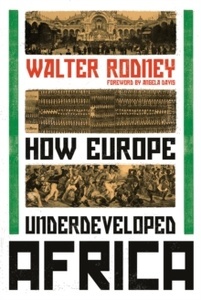How Europe Underdeveloped Africa

Editorial Verso Books
Fecha de edición septiembre 2021 · Edición nº 1
Idioma inglés
EAN 9781788731188
416 páginas
Libro
encuadernado en tapa blanda
Dimensiones 140 mm x 210 mm
Resumen del libro
The classic work of political, economic, and historical analysis, powerfully introduced by Angela Davis In his short life, the Guyanese intellectual Walter Rodney emerged as one of the leading thinkers and activists of the anticolonial revolution, leading movements in North America, South America, the African continent, and the Caribbean. In each locale, Rodney found himself a lightning rod for working class Black Power. His deportation catalyzed 20th century Jamaica's most significant rebellion, the 1968 Rodney riots, and his scholarship trained a generation how to think politics at an international scale.
In 1980, shortly after founding of the Working People's Alliance in Guyana, the 38-year-old Rodney would be assassinated. In his magnum opus, How Europe Underdeveloped Africa, Rodney incisively argues that grasping "the great divergence" between the west and the rest can only be explained as the exploitation of the latter by the former. This meticulously researched analysis of the abiding repercussions of European colonialism on the continent of Africa has not only informed decades of scholarship and activism, it remains an indispensable study for grasping global inequality today.
Biografía del autor
Angela Yvonne Davis (1944) nació en Birmingham, Alabama. Después de graduarse x{0026}lt;i magna cum laudex{0026}lt;/i en la Universidad Brandeis, cursó estudios de Filosofía en la Universidad Goethe de Frankfurt y se doctoró en la Universidad de California en San Diego. Tras quedar absuelta en 1972 de los cargos que pesaban contra ella y que la habían conducido a prisión, ha consagrado su vida a una incansable labor como escritora, ensayista, conferenciante y defensora de los derechos humanos, méritos que le han valido de manera unánime el reconocimiento internacional. Fue candidata a la vicepresidencia de Estados Unidos por el Partido Comunista en las elecciones de 1980 y 1984. Entre sus obras más célebres se encuentran x{0026}lt;i Mujeres, raza y clase,x{0026}lt;/i x{0026}lt;i La libertad es una batalla constantex{0026}lt;/i y x{0026}lt;i Democracia de la abolición.x{0026}lt;/i
Biografía del autor
Georgetown (Guyana), 1942-1980. Historiador, activista político y académico guyanés. Entre sus obras destaca Cómo Europa subdesarrolló a África (1972). Rodney viajó mucho y se hizo conocido internacionalmente como activista, académico y orador. Enseñó en la Universidad de Dar es Salaam en Tanzania durante los períodos 1966-67 y 1969-74, y en la Universidad de las Indias Occidentales en Mona (Jamaica) en 1968. Rodney fue muy crítico con la clase media por su papel en el Caribe posterior a la independencia, y en 1968 el Gobierno jamaicano le declaró persona non grata. La consiguiente prohibición de regresar a Jamaica y su despido de la Universidad provocaron fuertes protestas en Kingston, conocidas como los disturbios de Rodney, que resultaron en seis muertos y causaron millones de dólares en daños. Los acontecimientos desencadenaron un aumento de la conciencia política en todo el Caribe. Destacado panafricanista y marxista, Rodney fue también importante en el desarrollo del movimiento Black Power en el Caribe y América del Norte. En 1974 regresó a su país para ocupar un puesto como profesor en la Universidad de Guyana, pero el Gobierno guyanés impidió su nombramiento. En 1979 fue arrestado y acusado de incendiar dos oficinas gubernamentales, pero fue absuelto después por falta de pruebas. El 13 de junio de 1980, a la edad de 38 años, fue asesinado en Georgetown, por un explosivo colocado en su automóvil, apenas un mes después de regresar de las celebraciones de la independencia de Zimbabue.








